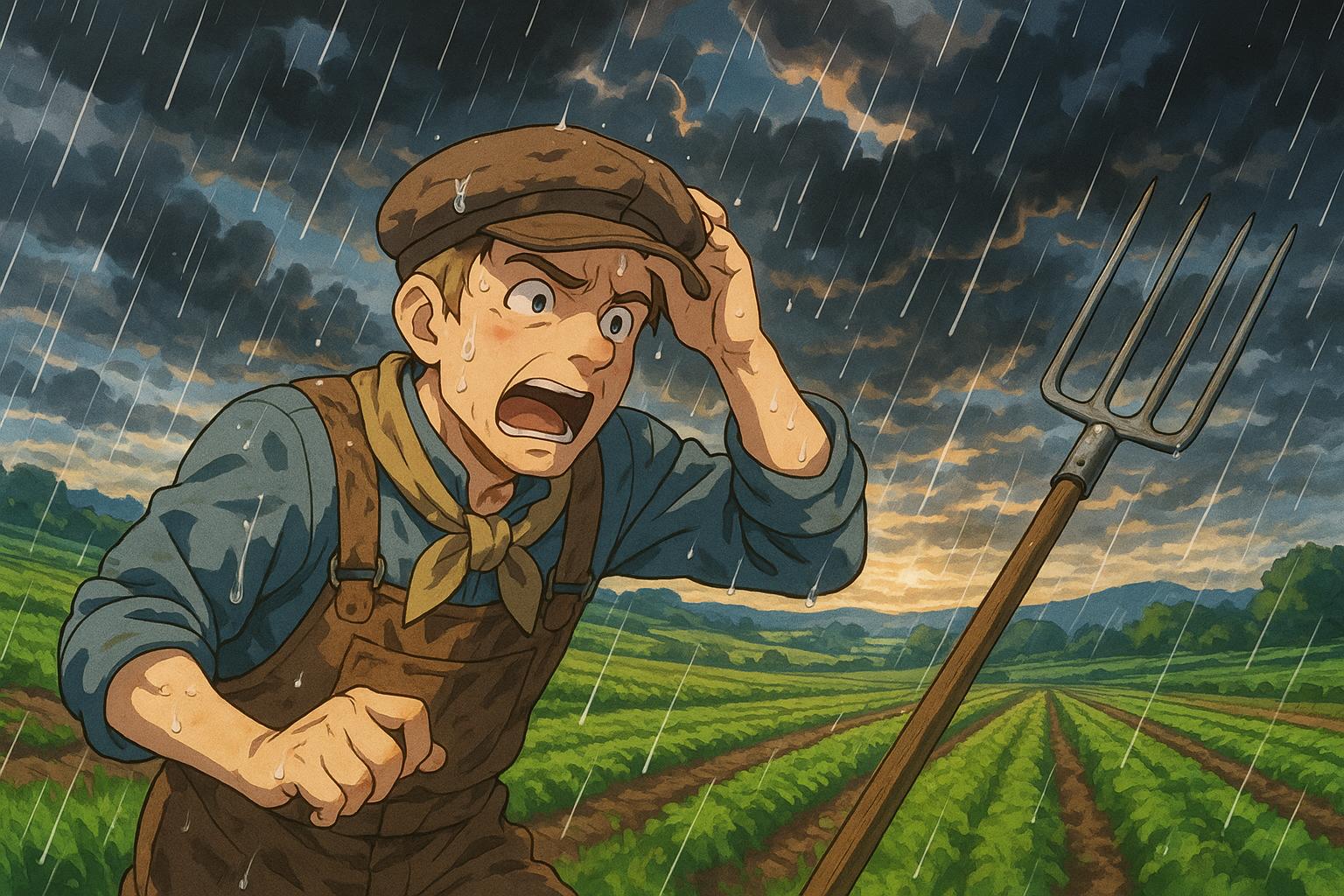Farmers in the UK suffered a record £1.19 billion loss from arable crops in 2023 due to extreme wet and stormy weather, raising concerns over food security and calls for increased government support amid worsening climate conditions.
UK farmers faced a staggering loss of £1.19 billion in income from arable crops in 2023, primarily due to the impacts of extreme wet and stormy weather. Recent figures from the Environment Department (Defra) reveal that while overall farm income increased from £6.1 billion to £7.7 billion between 2023 and 2024, income from key arable crops plummeted significantly. This decline was driven by considerable reductions in barley, wheat, and oilseed rape yields, partially offset by gains in potato production. The analysis by the Energy and Climate Intelligence Unit (ECIU) highlighted that this loss occurred during a year characterised by the third-worst harvest on record, exacerbated by relentless rainfall during crucial planting periods.
These adverse weather conditions are part of a worrying trend linked to climate change, with reports indicating that farmers could face another challenging year ahead. With this spring being the hottest and driest in decades, the anxiety surrounding crop yields continues to grow. Tom Lancaster, a land, food and farming analyst at the ECIU, stated, “Farmers are now counting the costs of climate change,” underscoring that extreme weather events are compromising the financial resilience of the agricultural sector and putting food security at risk.
The financial strain on farmers has also ignited calls for increased government support, particularly concerning sustainable farming initiatives. Martin Lines, chief executive of the Nature Friendly Farming Network, warned that the upcoming spending review could threaten vital funding necessary for enhancing resilience against climate extremes. He articulated the precarious situation, saying, “Months of dry weather have left my crops stressed,” noting that even with subsequent rainfall, the yield potential remains severely capped.
Adding to this challenging backdrop, the UK agricultural sector is grappling with a predicted drop in food self-sufficiency. According to ECIU projections, self-sufficiency in food could fall from an average of 86% in recent years to around 78% in the current year. Cereal self-sufficiency is expected to decline alarmingly, with wheat projections dropping from 92% to 68% and oilseed rape from 75% to just 40%. The National Farmers’ Union has raised alarms that consumer prices may be impacted, although some retailers express confidence in maintaining product availability.
The situation was compounded by exceptionally wet winter weather that devastated crop conditions, leaving large swathes of farmland unusable. The ECIU recently projected another potential loss of £889 million in revenue for arable crops during the notably wet winter of 2023-2024. This financial downturn reflects a broader trend of increasing volatility in farming, compounded by heightened dependence on imports and rising costs.
With assessments highlighting that this could lead to one of the worst harvests in UK history, farmers and analysts alike are keenly observing the government’s forthcoming decisions on funding and support for the farming sector. As Lancaster notes, “In this volatile context, the outcome of the spending review next week will be a crucial moment for farming in this country,” stressing the importance of recognising the stakes involved in protecting UK farming and food security amid a rapidly changing climate.
This evolving situation highlights not just the immediate financial impact of extreme weather on farmers, but also the long-term implications for rural communities and national food security. As environmental pressures mount, it is clear that a robust response from both the government and the agricultural sector is essential to mitigate the increasing risks posed by climate change.
 Reference Map:
Reference Map:
- Paragraph 1 – [1], [2]
- Paragraph 2 – [1], [3], [4]
- Paragraph 3 – [5], [7]
- Paragraph 4 – [6]
- Paragraph 5 – [4], [3]
- Paragraph 6 – [1], [2]
Source: Noah Wire Services
- https://www.irishnews.com/news/uk/uk-farmers-lost-1bn-in-arable-income-after-extreme-wet-weather-data-show-WVFY6C57NBPONERD5WOBPV2YZI/ – Please view link – unable to able to access data
- https://www.theguardian.com/environment/article/2024/jul/12/floods-fuelled-19-drop-in-income-from-farming-in-england-in-2023 – In 2023, England’s farming income dropped by 19% due to severe flooding, leading to a £1.1 billion decrease compared to 2022. The Met Office reported 1,695.9mm of rain from October 2022 to March 2024, the highest in any 18-month period since 1836. This extreme weather, linked to climate change, has intensified rainfall, adversely affecting crop yields and farm profitability. Farmers are calling for increased government support to adapt to these challenges and ensure food security.
- https://www.reuters.com/world/uk/historically-wet-winter-damage-uks-food-self-sufficiency-says-think-tank-2024-05-12/ – The UK’s food self-sufficiency is projected to decline by nearly 10% due to an exceptionally wet winter, according to the Energy & Climate Intelligence Unit (ECIU). Excessive rainfall left large areas of farmland waterlogged, preventing crop planting and damaging existing crops. Consequently, UK self-sufficiency in food is expected to drop from an average of 86% (2018-2022) to 78% this year. Wheat self-sufficiency could fall to 68% from 92%, and oilseed rape to 40% from 75%. Poor harvests are also anticipated for potatoes and onions. Increased reliance on imports may slow down the reduction in food inflation, which dropped from a 45-year high of 19.2% in March 2023 to 4% a year later. The National Farmers’ Union has cautioned that consumers may be affected, though Sainsbury’s CEO Simon Roberts expressed confidence in maintaining product availability. The analysis precedes a ‘Farm to Fork Summit’ hosted by Prime Minister Rishi Sunak, focusing on the food supply chain and highlighting climate change as an immediate threat to food security.
- https://eciu.net/analysis/reports/2024/estimated-financial-losses-faced-by-uk-farmers-due-to-wet-weather-impacts-on-key-arable-crops – The Energy & Climate Intelligence Unit (ECIU) estimates that UK farmers could lose £889 million in revenue from key arable crops due to the wet winter of 2023-2024. This is a 19% reduction compared to 2023 and a 23.8% decline compared to the 2015-2023 average. The analysis highlights the financial impact of extreme weather events on agriculture and underscores the need for adaptation strategies to mitigate such losses.
- https://www.theguardian.com/environment/2024/oct/10/harvest-in-england-the-second-worst-on-record-because-of-wet-weather – England experienced its second-worst harvest on record in 2024 due to heavy rainfall during the winter. Wheat production was estimated to be down by 21% compared to 2023. The cold, damp weather, stretching from last autumn through this spring and early summer, has also hit the rapidly developing UK wine industry particularly hard, with producers saying harvests are down by between 75% and a third, depending on the region. The article highlights the significant impact of extreme weather on crop yields and the broader agricultural sector.
- https://defrafarming.blog.gov.uk/2024/11/04/our-approach-to-farming-recovery-payments/ – In response to the exceptionally wet winter of 2023-2024, the UK government announced a one-off Recovery Payment to support farmers affected by Storms Babet and Henk. Payments, ranging from £2,895 to £25,000, aim to help cover the uninsured costs of restoring farmland. Approximately 13,000 farm businesses are eligible for this support, reflecting the government’s commitment to assisting the agricultural sector in recovering from extreme weather events.
- https://www.fwi.co.uk/business/business-management/sharp-fall-in-farm-business-incomes-for-cereals-and-dairy – Farm business incomes for cereals and dairy sectors have sharply declined, with cereal growers experiencing a 73% drop in income compared to the previous year. This decline is attributed to a substantial fall in farmgate prices for wheat, barley, and oilseed rape, as well as reduced wheat areas and lower yields. The article underscores the financial challenges faced by farmers in these sectors and the broader implications for the agricultural industry.
Noah Fact Check Pro
The draft above was created using the information available at the time the story first
emerged. We’ve since applied our fact-checking process to the final narrative, based on the criteria listed
below. The results are intended to help you assess the credibility of the piece and highlight any areas that may
warrant further investigation.
Freshness check
Score:
8
Notes:
The narrative presents recent data on UK farmers’ income losses due to extreme weather in 2024. Similar reports from mid-2024 highlighted a 19% drop in farming income in England, attributed to floods and poor yields. ([theguardian.com](https://www.theguardian.com/environment/article/2024/jul/12/floods-fuelled-19-drop-in-income-from-farming-in-england-in-2023?utm_source=openai)) The report from The Irish News, dated June 5, 2025, provides updated figures, indicating a £1.19 billion loss in arable income, aligning with previous findings but offering more precise data. The inclusion of recent data justifies a high freshness score, though the core information has been previously reported. The narrative appears to be based on a press release from the Energy and Climate Intelligence Unit (ECIU), which typically warrants a high freshness score. However, the repetition of similar content across multiple outlets suggests a potential recycling of information. Notably, the report mentions a £1.19 million loss, which seems to be a typographical error, as the context suggests a £1.19 billion loss. This discrepancy should be addressed for accuracy.
Quotes check
Score:
9
Notes:
The narrative includes direct quotes from Tom Lancaster, a land, food, and farming analyst at the ECIU, and Martin Lines, chief executive of the Nature Friendly Farming Network. A search reveals that these quotes are consistent with their previous statements in related reports from mid-2024. The consistency of these quotes across multiple reports suggests they are reused content. However, no earlier versions show different figures, dates, or quotes, indicating that the quotes are accurately attributed and consistent.
Source reliability
Score:
7
Notes:
The narrative originates from The Irish News, a reputable news outlet. The primary data is sourced from the ECIU, a well-regarded think tank. However, the report’s reliance on a press release from the ECIU introduces a potential bias, as press releases are often designed to promote the organization’s agenda. Additionally, the report includes a typographical error in the loss figure (£1.19 million instead of £1.19 billion), which raises concerns about the accuracy of the information presented.
Plausability check
Score:
8
Notes:
The narrative presents plausible claims regarding the financial impact of extreme weather on UK farmers in 2024. The reported £1.19 billion loss aligns with previous reports of significant income declines due to adverse weather conditions. The inclusion of quotes from relevant experts adds credibility to the claims. However, the typographical error in the reported loss figure (£1.19 million instead of £1.19 billion) raises questions about the accuracy of the data presented.
Overall assessment
Verdict (FAIL, OPEN, PASS): OPEN
Confidence (LOW, MEDIUM, HIGH): MEDIUM
Summary:
The narrative provides updated figures on the financial impact of extreme weather on UK farmers in 2024, aligning with previous reports but introducing a typographical error in the reported loss figure. The reliance on a press release from the ECIU introduces potential bias, and the typographical error raises concerns about the accuracy of the information presented. Further verification is needed to confirm the accuracy of the reported figures.













